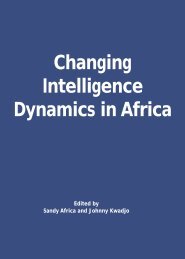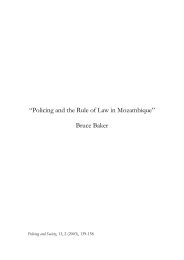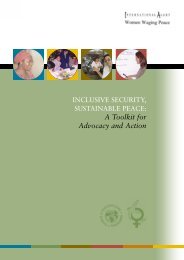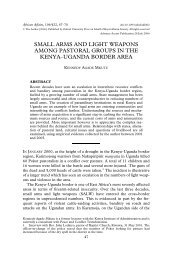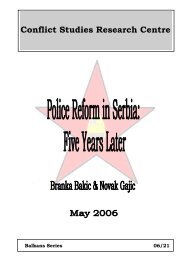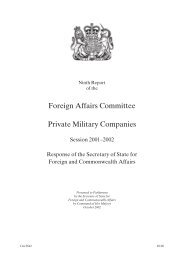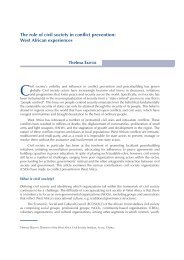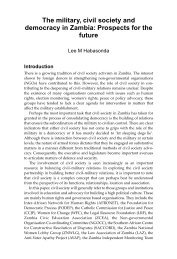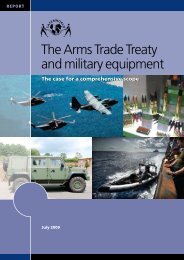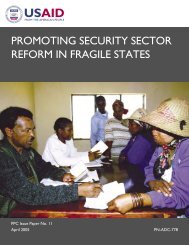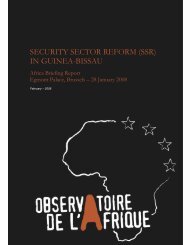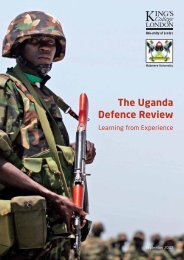AFGHANISTAN'S ELECTION CHALLENGES
AFGHANISTAN'S ELECTION CHALLENGES
AFGHANISTAN'S ELECTION CHALLENGES
Create successful ePaper yourself
Turn your PDF publications into a flip-book with our unique Google optimized e-Paper software.
Afghanistan’s Election Challenges<br />
Crisis Group Asia Report N°171, 24 June 2009<br />
Page iii<br />
(d) building in specific budgetary allocations for<br />
this and future election cycles.<br />
7. Ensure a more sustainable subnational government<br />
framework by tasking the Independent Directorate<br />
of Local Governance (IDLG) with supporting<br />
constitutionally mandated representative<br />
institutions, rather than parallel projects or bodies.<br />
8. Create a post-election strategy group including<br />
all relevant ministries, the National Assembly,<br />
civil society and major donors to lead strategic<br />
planning for the 2010 election and beyond including<br />
agreement on:<br />
(a) the date of the 2010 poll and a sustainable<br />
electoral timetable;<br />
(b) the creation of a robust voter registry and<br />
population data collection (census and/or civil<br />
registry); and<br />
(c) an appropriate legal framework for elections.<br />
To the National Assembly:<br />
9. Help ensure a solid and comprehensive legal<br />
framework for future elections, opening the issue<br />
to public hearings, including but not limited to:<br />
(a) selecting an appropriate party-based or mixed<br />
electoral system to replace SNTV in the Electoral<br />
Law;<br />
(b) clarifying Article 6 of the Political Parties<br />
Law relating to ethnic, racial and sectarian<br />
“bias” and removing unnecessary curbs on<br />
party formation and functioning, as well as<br />
setting out clear procedures regarding the bar<br />
on links to armed groups; and<br />
(c) considering the future shape and scope of the<br />
ECC to ensure a credible and sustainable<br />
mechanism to impartially enforce electoral<br />
standards and arbitrate disputes.<br />
10. Issue clear guidelines to members on use of official<br />
resources in their campaigns in 2010, to be<br />
monitored by the standing committee for members’<br />
immunities, salaries and privileges.<br />
To the U.S., European Union and its Member<br />
States and other Donor Nations:<br />
11. Increase election security by:<br />
(a) ensuring ISAF’s additional troops provided<br />
for the election remain in the areas where they<br />
are required, if necessary beyond the August<br />
polls, and are sufficient for the 2010 polls;<br />
(b) pressing Pakistan to end cross-border movement<br />
of insurgents; and<br />
(c) ensuring ongoing training and oversight and<br />
sufficient funds to retain the thousands of additional<br />
police recruited to help secure the<br />
polls.<br />
12. Support robust, ongoing democratisation by:<br />
(a) refraining from any words or actions that<br />
might be seen as endorsing individual candidates;<br />
(b) providing firm funding commitments for several<br />
more election cycles subject to specific<br />
goals for capacity building and sustainability,<br />
developed as part of the proposed postelection<br />
strategy group; and<br />
(c) in the remaining time before the 2010 polls,<br />
contributing information on illegal armed<br />
groups to ensure a strengthened vetting process<br />
and demanding action on disarmament.<br />
13. Balance support to the branches of state by providing<br />
far greater resources and attention to representative<br />
bodies by:<br />
(a) meeting regularly with the heads of political<br />
parties and parliamentary groupings;<br />
(b) providing technical assistance for the Wolesi<br />
Jirga and provincial council commissions;<br />
(c) funding women in local government initiatives;<br />
and<br />
(d) information-sharing and feedback sessions on<br />
development proposals with the relevant provincial<br />
councils and Wolesi Jirga commissions.<br />
To the United Nations:<br />
14. Build confidence in the electoral process by:<br />
(a) the Special Representative of the Secretary<br />
General (SRSG) robustly using his good offices<br />
to help mediate between parties on contentious<br />
issues on the electoral framework;<br />
(b) maintaining pressure on government and electoral<br />
institutions to uphold standards and<br />
speaking out against violations;<br />
(c) instructing local UN offices on appropriate<br />
forms of assistance to the process including<br />
monitoring the recruitment of district electoral<br />
staff; and<br />
(d) encouraging the international community to<br />
help provide information on illegal armed<br />
groups to strengthen future vetting processes.



